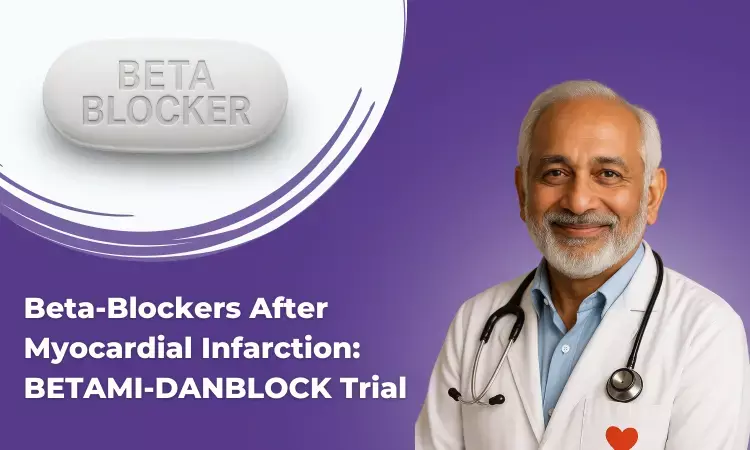- Home
- Medical news & Guidelines
- Anesthesiology
- Cardiology and CTVS
- Critical Care
- Dentistry
- Dermatology
- Diabetes and Endocrinology
- ENT
- Gastroenterology
- Medicine
- Nephrology
- Neurology
- Obstretics-Gynaecology
- Oncology
- Ophthalmology
- Orthopaedics
- Pediatrics-Neonatology
- Psychiatry
- Pulmonology
- Radiology
- Surgery
- Urology
- Laboratory Medicine
- Diet
- Nursing
- Paramedical
- Physiotherapy
- Health news
- Fact Check
- Bone Health Fact Check
- Brain Health Fact Check
- Cancer Related Fact Check
- Child Care Fact Check
- Dental and oral health fact check
- Diabetes and metabolic health fact check
- Diet and Nutrition Fact Check
- Eye and ENT Care Fact Check
- Fitness fact check
- Gut health fact check
- Heart health fact check
- Kidney health fact check
- Medical education fact check
- Men's health fact check
- Respiratory fact check
- Skin and hair care fact check
- Vaccine and Immunization fact check
- Women's health fact check
- AYUSH
- State News
- Andaman and Nicobar Islands
- Andhra Pradesh
- Arunachal Pradesh
- Assam
- Bihar
- Chandigarh
- Chattisgarh
- Dadra and Nagar Haveli
- Daman and Diu
- Delhi
- Goa
- Gujarat
- Haryana
- Himachal Pradesh
- Jammu & Kashmir
- Jharkhand
- Karnataka
- Kerala
- Ladakh
- Lakshadweep
- Madhya Pradesh
- Maharashtra
- Manipur
- Meghalaya
- Mizoram
- Nagaland
- Odisha
- Puducherry
- Punjab
- Rajasthan
- Sikkim
- Tamil Nadu
- Telangana
- Tripura
- Uttar Pradesh
- Uttrakhand
- West Bengal
- Medical Education
- Industry
The Betami-Danblock Trial: Randomized Discontinuation Of Beta-Blockers After Myocardial Infarction

BETAMI-DANBLOCK evaluates whether discontinuation of beta-blockers after MI is safe in patients with preserved or mildly reduced LVEF (>40%) in the modern PCI and secondary prevention era.
The trial randomizes 5,574 patients within 14 days of MI to beta-blocker therapy or no beta-blocker, with median follow-up of 3.5 years (Figure 1).
Figure 1: Patient Randomization and Follow-up in the BETAMI-DANBLOCK Trial
The primary endpoint, all-cause mortality or MACE (recurrent MI, unplanned revascularization, HF, ischaemic stroke, malignant ventricular arrhythmia), is significantly reduced with beta-blockers (HR 0.85, p=0.03, Figure 2).
Figure 2: Incidence of All-Cause Mortality or MACE
Secondary endpoints, including recurrent MI and heart failure, also favour beta-blocker therapy, while ischemic stroke shows no benefit (Figure 3).
Figure 3: Secondary Endpoints Outcomes
Subgroup analyses demonstrate consistent benefit across sex, age, country, MI type (STEMI/NSTEMI), and LVEF strata.
Clinical benefit persists irrespective of beta-blocker dose (≤50 mg vs. >50 mg metoprolol equivalent).
Figure 4: Subgroup Analyses of the Primary Endpoint
Conclusion:
The trial establishes that long-term beta-blocker therapy after MI reduces death and MACE in patients with LVEF >40%, reinforcing their role in secondary prevention.
In this randomized, controlled trial, oral betablocker therapy led to a lower risk of death from any cause or major adverse cardiovascular events (the composite primary end point) than no betablocker therapy among patients with a myocardial infarction and a preserved or mildly reduced left ventricular ejection fraction.
The clinical takeaway is that patient characteristics, including age, comorbidities, and baseline EF—strongly influence trial outcomes. The benefit of beta-blockers may therefore be context-dependent rather than universally applicable.
At present, there is no definitive conclusion for patients with preserved EF after myocardial infarction, and the panel highlights that the cardiology community is awaiting pooled data and meta-analyses to refine future guidelines.
Reference: Munkhaugen J, Kristensen AMD, Halvorsen S, et al. Beta-Blockers after Myocardial Infarction in Patients without Heart Failure. N Engl J Med. Published online August 30, 2025. doi:10.1056/NEJMoa2505985
Dr Prem Aggarwal, (MD Medicine, DNB Medicine, DNB Cardiology) is a Cardiologist by profession and also the Co-founder and Chairman of Medical Dialogues. He focuses on news and perspectives about cardiology, and medicine related developments at Medical Dialogues. He can be reached out at drprem@medicaldialogues.in


